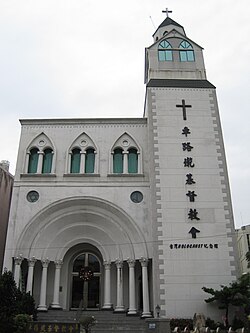Institutions
Taiwan Jewish Community

The Taiwan Jewish Community (TJC) is a non-denominational Jewish community in Taipei. During the 1950s, Jews in Taiwan would meet at the American military chapel. Expecting their support from the American military to end, they applied with the Taipei city government to register a Jewish foundation. This application was approved in 1978, officially establishing the Taiwan Jewish Community. [3] In 1975, Rabbi Ephraim Einhorn (Hebrew : אפרים פרדיננד איינהורן; Chinese :艾恩宏; pinyin :Ài Ēnhóng) arrived to serve as the island's sole rabbi. [4] For many years Rabbi Einhorn officiated at Sabbath and holiday services at the Landis Hotel and later the Sheraton Taipei. In 2015 the venue for the services moved to space in an office building provided by one of the community members. In 2020 the Taiwan Jewish Community moved to a location funded by the entire community. Attendance peaks around the High Holy Days, numbering around 200 individuals. [5] [6] [7] [8] Rabbi Einhorn died in 2021 in Taipei and his role in running the organization Taiwan Jewish Community was passed on to Leon Fenster. [9] In 2023 until 2025, Cody R. Bahir joined the Taiwanese Jewish Community as the congregation's first full-time rabbi, and Taiwan's first non-orthodox rabbi.[ citation needed ]
Jeffrey D. Schwartz Jewish Community Center of Taiwan
On December 29, 2021, the Jeffrey D. Schwartz Jewish Community Center of Taiwan was officially opened in Taipei. [10] The 22,500 square-foot center features a synagogue, mikveh (ritual bath), kosher culinary lab and kitchen, 300-person ballroom, classroom, library, and a museum of Judaica and Jewish art containing over 400 rare items. The center was funded, designed, and built by the Jeffrey D. Schwartz & NaTang Jewish Taiwan Cultural Association (JTCA), a non-profit organization founded by Jeffrey D. Schwartz, Founder and CEO of Four Star Group, and his wife Na Tang, an actress, musician, and author. The center offers a variety of cultural activities and is open to membership and participation by everyone in the Taiwan community, including those who adhere to other faiths. [11]
Chabad Taiwan
In the summer of 2011, upon the coming of the new Chabad emissaries, Rabbi Shlomi and Racheli Tabib, the Chabad Taiwan was founded. [12]

